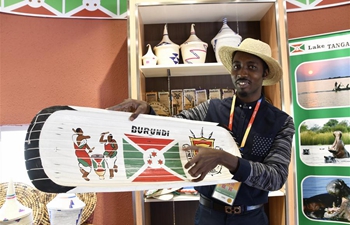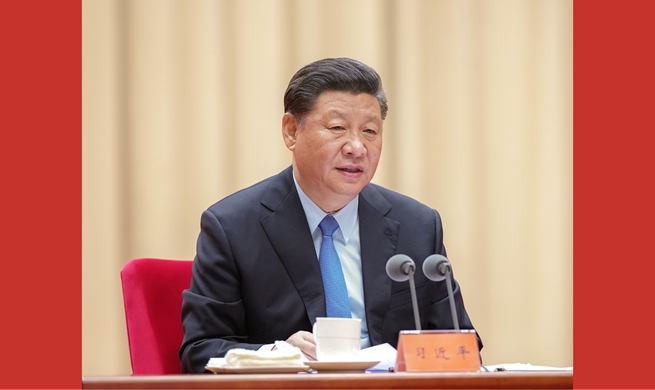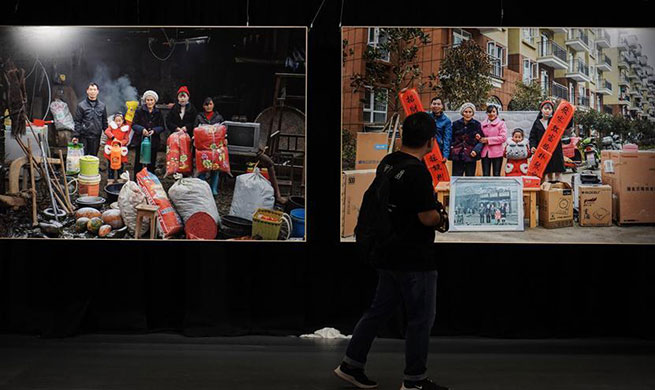WASHINGTON, May 31 (Xinhua) -- Scholars at the Atlantic Council, a U.S. think tank, on Friday railed against President Donald Trump's latest threat to impose tariffs of 5 percent on all Mexican imports.
During a teleconference call held by the Washington-based institution, Jason Marczak, director of the Council's Adrienne Arsht Latin America Center, said, "I hope this is just a threat because, frankly, these tariffs make no economic sense at all."
Trump announced in a tweet Thursday that the 5 percent tariffs covering the full spectrum of Mexican products sold to the United States will be implemented on June 10, and will remain in effect until Mexico has stopped the flow "illegal migrants" into the United States via the Latin American country.
The White House said in a statement issued following the president's tweet that the planned duties will be increased to 25 percent on Oct. 1 and permanently remain at that level "unless and until Mexico substantially stops the illegal inflow of aliens coming through its territory."
Marczak said total trade volume between the United States and Mexico for March 2019 amounts to 150 billion dollars. "This is not classic importing and exporting, this is supply chain-based trade, we make products together."
Noting that U.S. autos, for example, rely on sourcing from Mexico, Marczak said there will be "a direct hit on U.S. consumers" if the administration implements the tariffs.
"U.S. consumers will face an even graver situation because the president never even outlined what Mexico needs to do to not have these tariffs imposed," he said.
According to Marczak's estimates, if tariffs on Mexican products rise to 25 percent, the United States will pay 3.6 percent more in cost for car manufacturing. "The country doesn't pay tariffs," he said. "Tariffs are paid for by companies and companies pass those costs onto their consumers."
In addition to the harm done to consumers, the tariffs will also lead to further job loss in the U.S. auto industry, Marczak said, adding that the trend is against the backdrop of nearly 20,000 jobs being caught in the auto industry through April this year, the highest in 10 years.
Trump claimed in a Friday tweet that Mexico has taken 30 percent of the U.S. auto industry. Refuting that assertion, Bart Oosterveld, director of the Global Business and Economics Program at the Atlantic Council, said that the auto industry is already not doing well.
"The supply chain is deeply integrated," Oosterveld said. "If the 25 percent of tariffs were imposed, it would be highly disruptive to the auto supply chain," he said, adding that there is "a wide spread misunderstanding" within the administration about who pays for tariffs.
Valeria Moy, nonresident fellow at the Adrienne Arsht Latin America Center, said given that Mexico is aware of the importance of its trade relationship with the United States, she believes Trump's tariff threat is unlikely to result in the Mexican Congress blocking the United States-Mexico-Canada Agreement (USMCA), a priority on Trump's trade agenda.
She stressed, however, the tariffs will make collaboration between the two countries much more difficult. "My personal opinion is that in this specific time, we should do more collaboration, instead of less, given the trade and migration issues."
Moy said she hopes that the tariffs remain a threat, but when the threat was made at the presidential level, "it's really difficult to go back."
"To be honest, I don't know what else Mexico can do to try to stop migration," she said. "I mean the economic reality of this country is going to drive migration, whether we like it, or we allow it, or we don't."
The migrant issue, Moy said, is much more complicated than Trump has thought and cannot be solved by imposing tariffs. "In the end, it will only hurt U.S. consumers, and, of course, the Mexican economy as a whole when it starts to lose competitiveness."
Trump claimed in a tweet that his tariffs will see companies leave Mexico and bring back the portion of auto industry that the United States lost to its southern neighbor.
"He's basically lying because basically the car industry is pretty much automatized, so there will be no jobs going back," Moy said.













